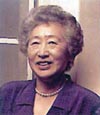Politicians
Ogata Sadako
(Tokyo, 1927- )
 While Japan has been slow in its promotion of women to top posts in politics or business and is often derided for its lack of concrete effort in global politics, one woman has a spent the last decade defying that trend. Ogata Sadako spent most of the 1990s working as United Nations High Commissioner for Refugees, a difficult post to which she brought a patient, hard-working and devoted spirit. Rather than sitting behind a desk, she is known for her belief in seeing a situation first hand. Despite taking on the post of UNHCR at an age when most people are retiring, she kept up a busy schedule of traveling to areas of conflict around the world.
While Japan has been slow in its promotion of women to top posts in politics or business and is often derided for its lack of concrete effort in global politics, one woman has a spent the last decade defying that trend. Ogata Sadako spent most of the 1990s working as United Nations High Commissioner for Refugees, a difficult post to which she brought a patient, hard-working and devoted spirit. Rather than sitting behind a desk, she is known for her belief in seeing a situation first hand. Despite taking on the post of UNHCR at an age when most people are retiring, she kept up a busy schedule of traveling to areas of conflict around the world.
Ogata was born into a political family in 1928. Her father, Nakamura Toyokazu was a diplomat; her grandfather, Yoshizawa Kenkichi was a foreign minister and her great-grandfather, Inukai Tsuyoshi was prime minister in the 1930s. She studied in the United States at Georgetown University and UC, Berkeley and returned to Japan to teach politicalscience at the international Sophia University (Jochi Daigaku).
In 1976, she became a member of Japan's mission to the United Nations. She became chairman of the executive board of UNICEF in 1978. And from 1982-85, she was Japan's representative to the UN's Commission on Human Rights. She divided her time between diplomacy and teaching until her posting as UNHCR in 1991.
Recently, her experience and first-hand knowledge of the situation in the country made her an ideal choice to be Japan's special envoy for Afghan affairs. In January 2002, at the age of 74, she could be seen on Japanese TV news reports trekking in the hills of Afghanistan. Just a week later, she was back in Tokyo playing an important role in the international conference on the reconstruction of the war-torn country. Her hard work was instrumental in securing pledges of assistance from many organizations and countries.
Despite her age, Ogata was considered by many to be an ideal candidate for Foreign Minister during the term of former prime minister Koizumi Junichiro, with whom she clearly enjoyed a good relationship. But she insisted on keeping her home in New York, and is still active with the UN. She is married with a son and a daughter.
